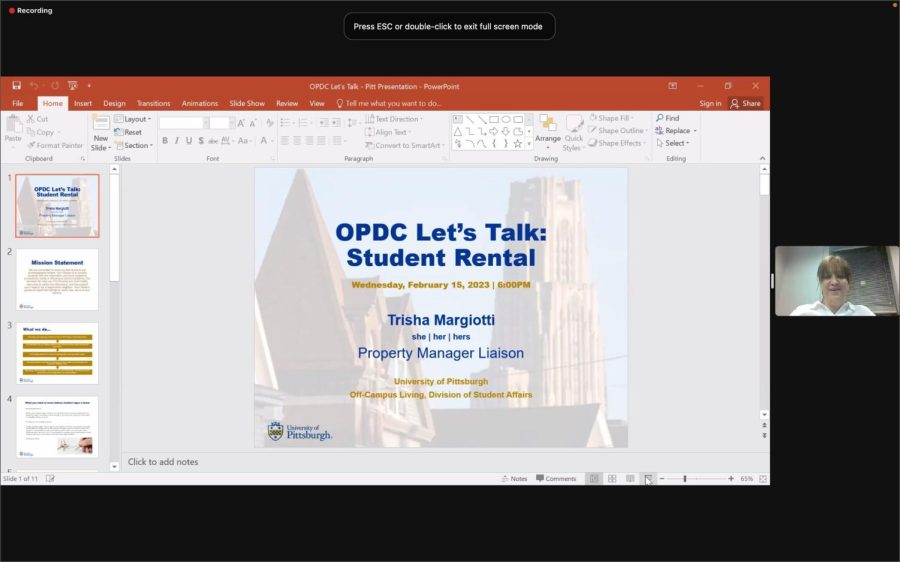OPDC talks student rentals, navigating landlord-tenant relationships
Screenshot of Let’s Talk: Student Rental meeting.
February 17, 2023
Lizabeth Gray, neighborhood quality consultant at the Oakland Planning and Development Corporation, said each student living in an off-campus rental should have their name on the lease for protection and rights.
“I dealt with some students over the holiday break that had a water pipe break in their place,” Gray said. “They had one student that wasn’t on the lease, and she had no protection at all.”
OPDC held a meeting titled “Let’s Talk: Student Rental” on Wednesday both in person at 294 Semple Street and over Zoom to discuss issues that students face while living in an off-campus rental. These issues include liabilities, habitability and noisy parties. The event featured guest speakers Adam Dibuo from Neighborhood Legal Services and Trisha Margiotti from Pitt’s Office of Off-campus Living.
OPDC invited Dibuo, managing attorney at NLS, to discuss students’ rights and responsibilities. Dibuo said NLS provides free legal services to low-income families in civil legal situations, particularly landlord-tenant cases. He said students should do their best to make sure that they are moving in with a responsible roommate and tenant.
“Leases have what’s called joint and several liability, so each person is responsible for their portion of the rent, but each person can also be responsible for the entire portion of the rent if it is not paid by any of their roommates,” Dibuo said. “It’s really important if you’re a student to make sure that you and your cosigner are aware of the amount of rent that is going to be paid and to be aware of who your roommates are and to make sure that you have kind of properly vetted them.”
Margiotti, property manager liaison at OOL, said her mission is to ensure that students are knowledgeable renters. She said she works to provide students with the information and tools needed to successfully find and live in a place off-campus.
“We just want to make sure students know when to sign a lease, how to send a rental application, how to view their lease, what to sign, what not to sign, renter’s insurance, making sure students are following occupancy limits – no more than three unrelated people in a single-family dwelling.” Margiotti said.
Dibuo said each lease includes the implied warranty of habitability which states that every landlord has the obligation to give a tenant a safe, habitable and sanitary resident to live in. Habitability issues include constant leaks, faulty electric or infestation issues. He said if landlords do not address housing issues within a reasonable time frame, students should try to resolve it themselves.
“If you have the capability to do so, hire somebody to fix the problem and then bring that to your landlord and let them know that you would want to be compensated for that issue which you fixed after their failure to do so,” Dibou said. “If you are not able, you would like to withhold rent in that amount the next time you pay rent. Regardless, you need to give your landlord some notice that you are going to be taking one of these remedies.”
According to Gray, while searching for rentals, students have encountered landlords that require tenants to pay rent in small cash bills. Dibuo said paying rent in cash is always “a horrible idea.”
“If your landlord asks you to pay cash, just find a new landlord,” Dibuo said. “I don’t really care if they say that they’re going to give you a receipt. All it takes is for them to not do it one time or you lose a receipt one time and then you’re out of luck. I would just say that’s a huge red flag. It’s 2023. If your landlord wants you to pay cash, it’s because they’re committing tax fraud.”
Gray also noted that many students adopted pets during the pandemic without realizing the time and effort that is required, which has become a problem on campus. She said student face added challenges when they adopt pets, especially when renting in urban communities.
“This is a problem that truly was born out of a pandemic more so than most years and a lot of people didn’t get past it,” Gray said. “If the student gets to a point where they cannot deal with the pet, there are several organizations in the city that will gladly let you surrender your animal.”
According to Dibou, renters have the right to quiet enjoyment under Pennsylvania law. Dibou said if students decide to host parties, neighbors can choose to call the police due to noise complaints. He said landlords can sometimes decide to evict renters in this situation.
“If that becomes an issue that you are continually doing things that breach your surrounding neighbors’ right to quiet enjoyment, your landlord can take legal action against you for that,” Dibou said.



